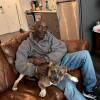Boston Mayor Marty Walsh had just finished a briefing for reporters, on the city's latest efforts to tackle coronavirus, when he was approached by a woman who was not a member of the press.
She looked a little intimidated walking right up to the mayor – but she did anyway. The two spoke briefly – I couldn’t hear the conversation. Walsh seemed to be reassuring her. Then the woman turned to leave.
The woman – who agreed to talk on tape on the condition I didn’t use her name – told me she’s homeless, and has been for the last eight months. She’d approached Walsh because she’s worried – for herself and for other homeless people she knows, as they navigate the threat of coronavirus, on top of the already-crushing burden of being homeless.
“I was going to ask him while the cameras were on but I also don’t want to call him out, because if I need to come to him to ask for something I want him to be on my side you know?” she said.
“I know a lot of them are getting concerned. They’re thinking, “What are we going to do about health care, about testing, what are we going to do about keeping safe?”
She’s not the only one asking whether there is a plan for thousands of people who are homeless in Massachusetts, many living in crowded shelters housing two, three hundred people ever night.
So far, shelters are staying open -- and state officials say they're not subject to a recent order by Governor Charlie Baker restricting gatherings to 25 people or fewer.
But that doesn’t answer the question of how crowded shelters are supposed to provide shelter to all those people – and keep them safe – at the same time
“Right. That's a very difficult task. And within the shelter system, because of the spatial and occupancy issues that the shelters face, that it's virtually impossible to do,” says Joe Finn, president and executive director of the Mass Housing and Shelter Alliance, a nonprofit that advocates for shelter operators across the state.
Finn said that so far there has been little guidance from the state on how providers can prevent an outbreak within shelters – or what to do if an outbreak occurs.
“The fear of among many of the providers is, is that the transmission, once it hits the shelter, will be rapid,” Finn said.
“If it hasn't hit it already.”
Joe Yazwinski runs the Father Bill’s and MainSpring shelters in Brockton and Quincy. On average night the two shelters provide beds for between two hundred and two hundred and eighty individuals.
Yazwinski said shelter operators are finding themselves caught between a rock and a hard place when it comes to fulfilling their mission to provide emergency shelter on the one hand, and protecting residents and staff on the other.
“For us to meet the recommended CDC practices of social distances, to try to implement these in our congregate shelters is absolutely impossible,” Yazwinski said.
He and other shelter operators, as well as advocates for the homeless and for public health, are saying there needs to be a plan at the state level, and now, to provide alternative quarantine sites for people who are homeless and could be infected.
General guidance for people to stay at home to reduce the risk of being exposed to, or exposing others to infection has no practical application for those seeking emergency shelter, Yazwinski said.
“They don’t have a home so they can’t shelter at home,” he said. “To be in close confines in our shelters could be really devastating.”
“So we really need emergency help, immediately.”
The state’s Department of Housing and Community Development, which oversees homeless services, declined to make someone available to talk by phone.
The agency did send a statement that included official guidance for shelters, which advises that if a resident exhibits symptoms, they should be isolated.
But as Yazwinski points out, the shelters don't have special isolation facilities - or anything close to that
“We are in overflow on our individual shelters. People are sleeping on our floors. And you know the majority of our population are the at-risk population we have over 80 elders between our two shelters with a lot of compromised immune systems.
State officials say they are working on a plan and are in touch with shelter operators - but those same shelter operators say if there is a plan they haven't seen it yet.
Kelly Turley, associate director for the Massachusetts Coalition for the Homeless, said her group is advocating for state action on everything from a moratorium on evictions during the outbreak to prevent more people from becoming homeless, to increased funding and services to provide food and other basic necessities, to immediately increasing housing capacity for those experiencing homelessness – including providing facilities in which those individuals or families can be safely in quarantine.
Turley is urging state and local officials to think outside the box when it comes to identifying potential overflow or extra emergency housing capacity.
“At the local level, cities and towns are working to identify those spaces,” Turley said.
But “So far it doesn’t seem that the overflow capacity, alternative sites are really in place statewide,” Turley said.
Meanwhile, the city of Boston is taking action on its own. City officials told WGBH News Tuesday they're installing tents outside two major city homeless shelters that will be used for testing and screening for coronavirus as well, if needed, as quarantine facilities for homeless individuals who have the virus.
Boston officials think they'll have quarantine capacity for twenty to forty people - but no one really knows if that will be enough.



